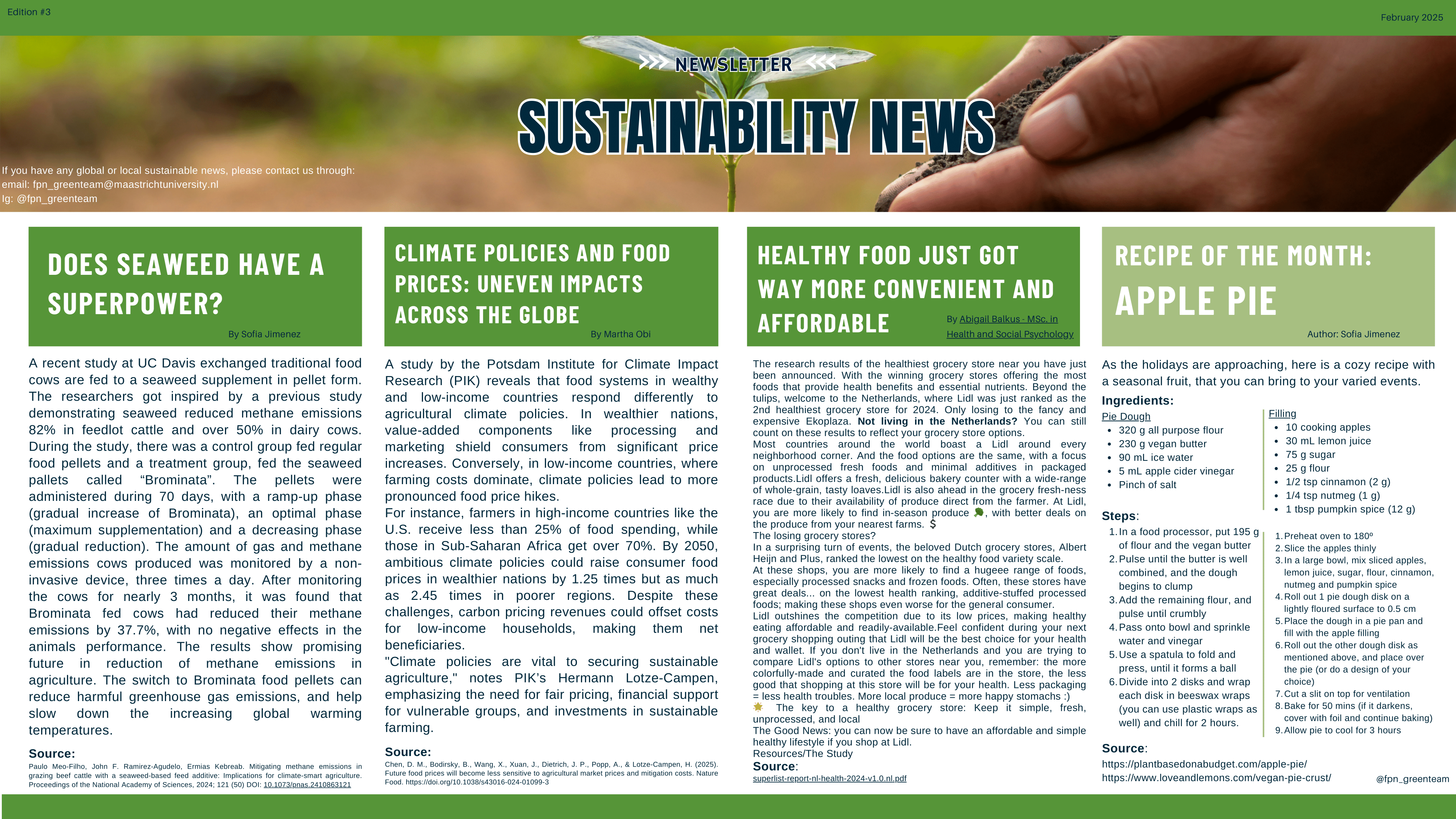Sustainability news by FPN Green Team
Read the latest sustainability news from the FPN Green Team!
Does seaweed have superpower? by Sofia Jiminez
A recent study at UC Davis exchanged traditional food cows are fed to a seaweed supplement in pellet form. The researchers got inspired by a previous study demonstrating seaweed reduced methane emissions 82% in feedlot cattle and over 50% in dairy cows. During the study, there was a control group fed regular food pellets and a treatment group, fed the seaweed pallets called “Brominata”. The pellets were administered during 70 days, with a ramp-up phase (gradual increase of Brominata), an optimal phase (maximum supplementation) and a decreasing phase (gradual reduction). The amount of gas and methane emissions cows produced was monitored by a noninvasive device, three times a day. After monitoring the cows for nearly 3 months, it was found that Brominata fed cows had reduced their methane emissions by 37.7%, with no negative effects in the animals performance. The results show promising future in reduction of methane emissions in agriculture. The switch to Brominata food pellets can reduce harmful greenhouse gas emissions, and help slow down the increasing global warming temperatures.
Source:
Paulo Meo-Filho, John F. Ramirez-Agudelo, Ermias Kebreab. Mitigating methane emissions in
grazing beef cattle with a seaweed-based feed additive: Implications for climate-smart agriculture.
Proceedings of the National Academy of Sciences, 2024; 121 (50) DOI: 10.1073/pnas.2410863121
Climate policies and food prices: uneven impacts across the globe by Martha Obi
A study by the Potsdam Institute for Climate Impact Research (PIK) reveals that food systems in wealthy and low-income countries respond differently to agricultural climate policies. In wealthier nations, value-added components like processing and marketing shield consumers from significant price increases. Conversely, in low-income countries, where farming costs dominate, climate policies lead to more pronounced food price hikes. For instance, farmers in high-income countries like the U.S. receive less than 25% of food spending, while those in Sub-Saharan Africa get over 70%. By 2050, ambitious climate policies could raise consumer food prices in wealthier nations by 1.25 times but as much as 2.45 times in poorer regions. Despite these challenges, carbon pricing revenues could offset costs for low-income households, making them net beneficiaries. "Climate policies are vital to securing sustainable agriculture," notes PIK’s Hermann Lotze-Campen, emphasizing the need for fair pricing, financial support for vulnerable groups, and investments in sustainable farming.
Source:
Chen, D. M., Bodirsky, B., Wang, X., Xuan, J., Dietrich, J. P., Popp, A., & Lotze-Campen, H. (2025).
Future food prices will become less sensitive to agricultural market prices and mitigation costs. Nature
Food. https://doi.org/10.1038/s43016-024-01099-3
Healthy food just got way more convenient and affordable by Abigail Balkus
The research results of the healthiest grocery store near you have just been announced. With the winning grocery stores offering the most foods that provide health benefits and essential nutrients. Beyond the tulips, welcome to the Netherlands, where Lidl was just ranked as the 2nd healthiest grocery store for 2024. Only losing to the fancy and expensive Ekoplaza. Not living in the Netherlands? You can still count on these results to reflect your grocery store options. Most countries around the world boast a Lidl around every neighborhood corner. And the food options are the same, with a focus on unprocessed fresh foods and minimal additives in packaged products. Lidl offers a fresh, delicious bakery counter with a wide-range of whole-grain, tasty loaves. Lidl is also ahead in the grocery fresh-ness race due to their availability of produce direct from the farmer. At Lidl, you are more likely to find in-season produce, with better deals on the produce from your nearest farms. The losing grocery stores? In a surprising turn of events, the beloved Dutch grocery stores, Albert Heijn and Plus, ranked the lowest on the healthy food variety scale. At these shops, you are more likely to find a hugeee range of foods, especially processed snacks and frozen foods. Often, these stores have great deals... on the lowest health ranking, additive-stuffed processed foods; making these shops even worse for the general consumer. Lidl outshines the competition due to its low prices, making healthy eating affordable and readily-available. Feel confident during your next grocery shopping outing that Lidl will be the best choice for your health and wallet. If you don't live in the Netherlands and you are trying to compare Lidl's options to other stores near you, remember: the more colorfully-made and curated the food labels are in the store, the less good that shopping at this store will be for your health. Less packaging = less health troubles. More local produce = more happy stomachs :) The key to a healthy grocery store: Keep it simple, fresh, unprocessed, and local. The Good News: you can now be sure to have an affordable and simple healthy lifestyle if you shop at Lidl.
Resources/The Study
Source:
superlist-report-nl-health-2024-v1.0.nl.pdf
